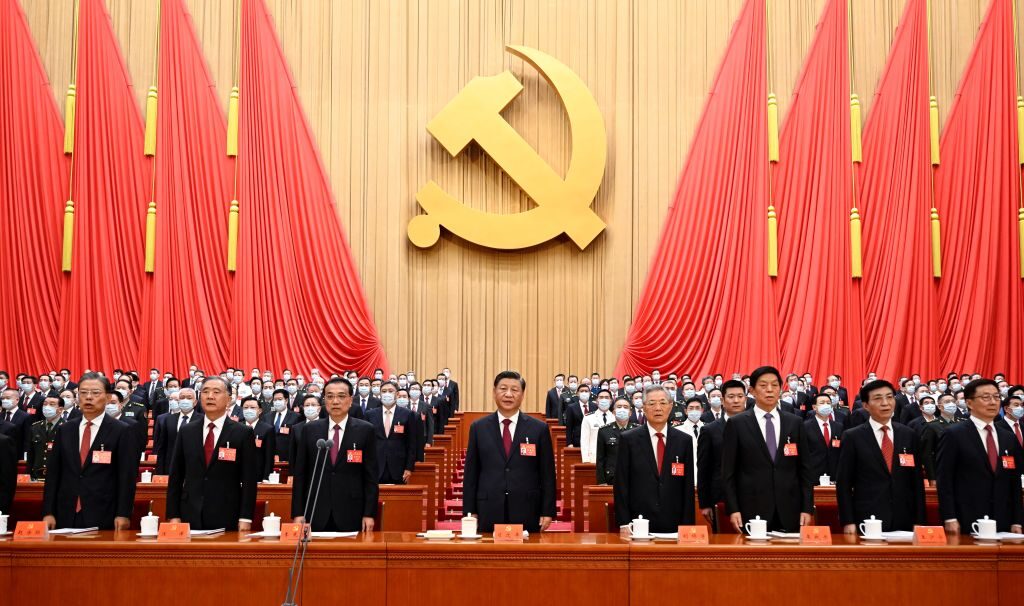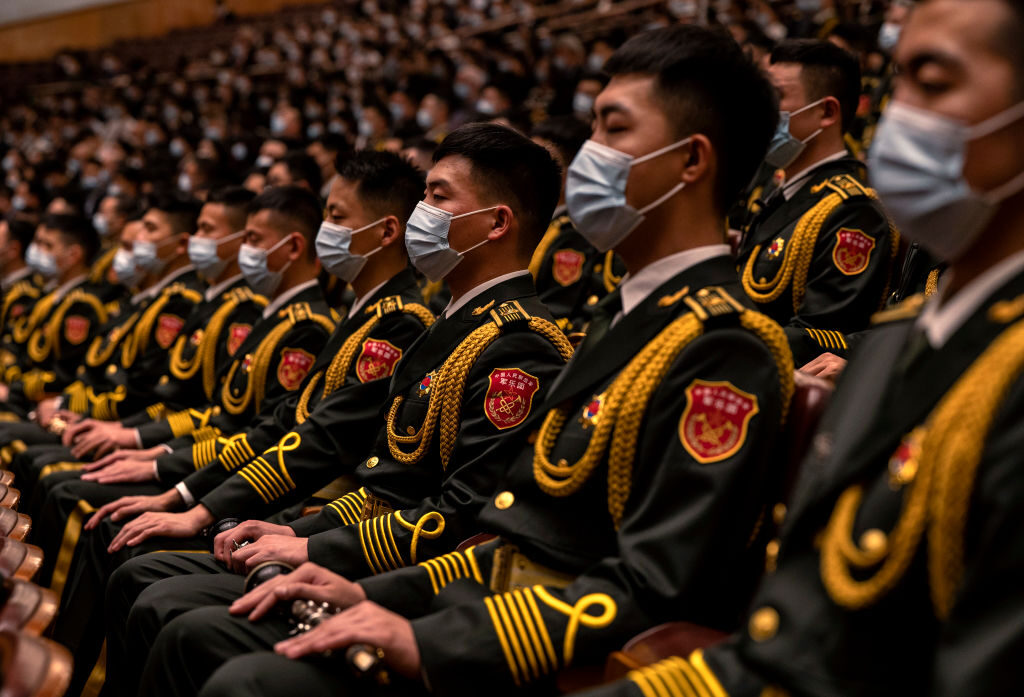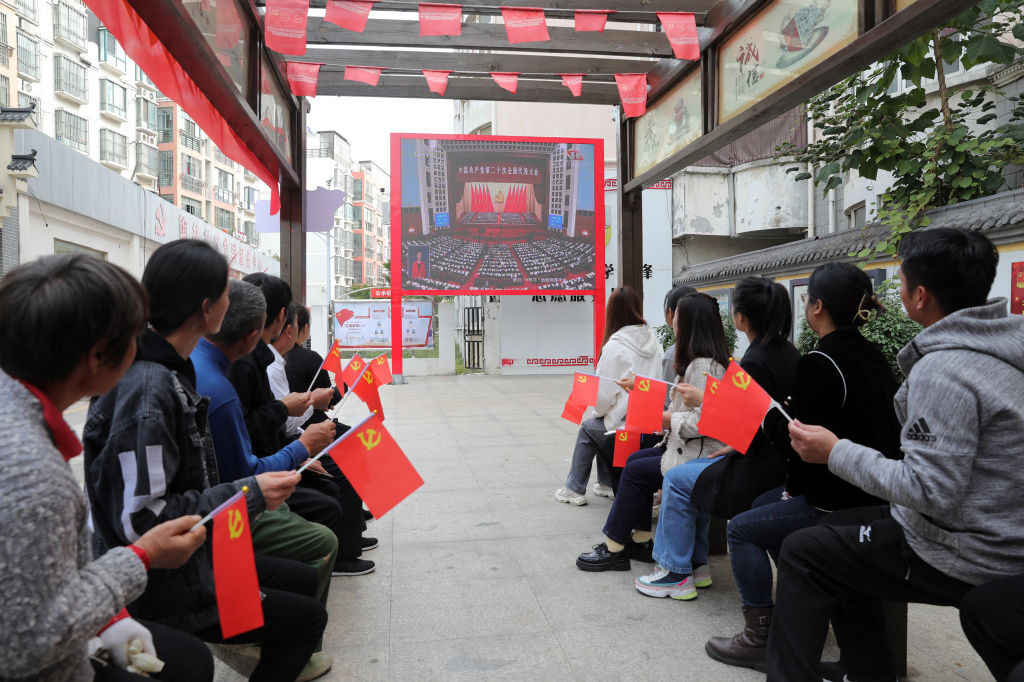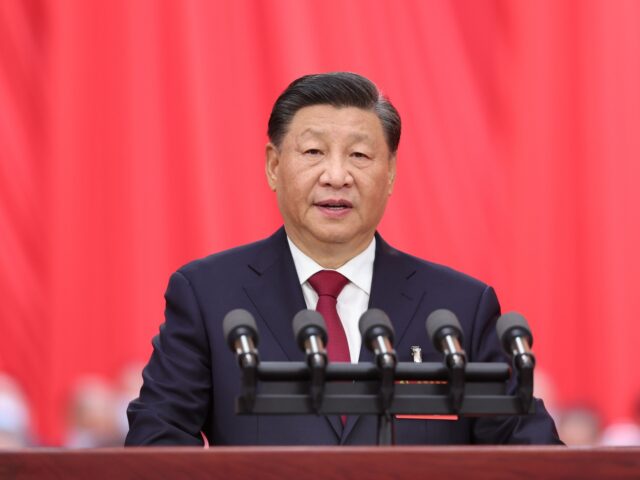Chinese dictator Xi Jinping opened this year’s Communist Party Congress on Sunday with a two-hour speech in which he threatened violence towards Taiwan, insisting “all measures necessary” are on the table to annex the neighboring country.
The Communist Party Congress occurs every five years and is meant to present a blueprint for governance and leadership for the following five years.
In the past, the Congress was used to choose a president and assign other high-ranking titles to Politburo members, but for the past decade Xi Jinping has firmly entrenched himself at the helm of the party, turning the Congress into a sort of coronation ceremony rather than an authentic ritual to choose a leader.
Xi’s speech on Sunday was about an hour and a half shorter than his address to the Congress in 2017 – and markedly more reserved in its promises of prosperity and supremacy for China. Xi falsely claimed that his regime had “eradicated absolute poverty,” a claim the Communist Party began making in 2020 and repeated as new a year later.
He also focused on compelling listeners to “further work in developing a socialist ideology that has the power to unite and inspire the people,” avoiding the specifics of running the country.

Xi Jinping, Li Keqiang, Li Zhanshu, Wang Yang, Wang Huning, Zhao Leji, Han Zheng and Hu Jintao attend the opening session of the 20th National Congress of the Communist Party of China CPC at the Great Hall of the People in Beijing, capital of China, Oct. 16, 2022. The 20th CPC National Congress opened on Sunday. (Li Xueren/Xinhua via Getty Images)

Members of he Peoples Liberation Army band are seated during the Opening Ceremony of the 20th National Congress of the Communist Party of China at The Great Hall of People on October 16, 2022 in Beijing, China. Chinese President Xi Jinping is widely expected to secure a third term in power. ( Kevin Frayer/Getty Images)
On Taiwan, Xi offered more clarity: the country must accept conquest by China or face war.
“Resolving the Taiwan question is a matter for the Chinese, a matter that must be resolved by the Chinese,” Xi asserted, according to the Chinese government network CGTN. “We will continue to strive for peaceful reunification with the greatest sincerity and the utmost effort, but we will never promise to renounce the use of force, and we reserve the option of taking all measures necessary.”
Unlike Xi’s typical threats, the dictator added a caveat that he was not trying to terrify Taiwanese civilians.
“This is directed solely at interference by outside forces and the few separatists seeking ‘Taiwan independence’ and their separatist activities; it is by no means targeted at our Taiwan compatriots,” he concluded.
Taiwan is a sovereign, democratic country off the coast of China. No government based in Beijing has ever governed Taiwan in its history. Its current government was established by anti-communists who traveled to the island after Mao Zedong conquered China, a history the Communist Party uses to claim that it has a legitimate right to rule Taiwan. Beijing officially claims Taiwan as a “province” and considers its democratically elected government a rogue “separatist” organization.
In contrast to his remarks on Sunday, during the 2017 Communist Party Congress, Xi declared that China was ready to “take center stage” in the world and threatened any nation that recognized Taiwan’s sovereignty, not just Taiwan itself.
“We will never allow anyone, any organization, or any political party, at any time or in any form, to separate any part of Chinese territory from China,” Xi said at the time. “No political party or group in Taiwan will have any difficulty conducting exchanges with the mainland [China].”

This photo taken on October 16, 2022 shows people holding Communist Party flags as they watch the opening session of the 20th Chinese Communist Party Congress in Huaibei, in Chinas eastern Anhui province. (STR/AFP via Getty Images)
Xi’s abusive rhetoric peaked in 2019, shortly before the coronavirus pandemic that the Chinese government created through mismanagement in the city of Wuhan. During a visit to Nepal, Xi warned, “anyone attempts to split any region from China will perish, with their bodies smashed and bones ground to powder.”
China Daily, a government newspaper, paraphrased Xi also addressing the situation in Hong Kong. The last Party congress occurred years before the millions-strong anti-communist protests in Hong Kong in 2019, so Xi’s speech had little content regarding Hong Kong or neighboring Macau other than a mild statement of support for Chinese governance in the former European colonies. On Sunday, Xi declared victory against the pro-democracy protesters – many imprisoned as a result of the tyrannical 2020 “national security” law that forbids dissent.
“The policy of One Country, Two Systems is a great innovation of socialism with Chinese characteristics, Xi said,” according to China Daily. “It has proven to be the best institutional arrangement for ensuring sustained prosperity and stability in Hong Kong and Macao after their return to the motherland. This policy must be adhered to over the long term, Xi stressed. ”
“We will see that Hong Kong and Macao are administered by patriots, he added,” the newspaper continued. “He also pledged support to Hong Kong and Macao in better integrating themselves into China’s overall development and playing a greater role in realizing national rejuvenation.”
“One Country, Two Systems” is the formal name for the governance policy between China and Hong Kong. Under this policy, adopted following the United Kingdom’s surrender of Hong Kong to China in 2017, Hong Kong was forbidden from pursuing independence, but China was forbidden from applying any laws set in place by Beijing, allowing Hong Kong to remain capitalist. “One Country, Two Systems” died with the 2020 implementation of the “national security” law, passed by Beijing’s National People’s Congress.
China’s military on Friday staged its second-largest incursion into Taiwan’s air defense identification zone (ADIZ) this year, ordering 18 warplanes to fly through the special zone, the Taipei Times reported. https://t.co/pL4tb3Shbi
— Breitbart News (@BreitbartNews) May 10, 2022
China has openly entertained the possibility of imposing “One Country, Two Systems” on Taiwan, prompting enthusiastic mass rejection in the island nation.
The Global Times, another Communist Party propaganda outlet, praised Xi’s suggestion to use violence to colonize Taiwan.
“Non-peaceful means are also options targeting mainly interference by outside forces and the separatist activities, which also clearly draws out our principle and bottom-line,” Tian Feilong, a regime-approved “expert,” told the Global Times, “helping to form a strong deterrence to separatists and external forces and aiming to win more support in the island for peaceful reunification.”
Another expert identified as college dean Zhang Wensheng called threats of violence “extremely necessary” due to “foreign forces,” presumably America, offering support to Taiwan.
Taiwan’s government reacted with outrage to Xi’s speech on Monday.
“Taiwan has never been a part of the People’s Republic of China,” Taiwan’s Mainland Affairs Council (MAC) asserted in a statement. The ruling Democratic Progressive Party issued separate remarks promising civilians that it would not compromise in “safeguarding the country’s sovereignty and protecting freedom and democracy,” according to the Taipei Times.
Follow Frances Martel on Facebook and Twitter.

COMMENTS
Please let us know if you're having issues with commenting.